
– 01-09-2024 –
Twenty-Second Sunday in Ordinary Time
Gospel reading: Mark 7:1-8, 14-15, 21-23
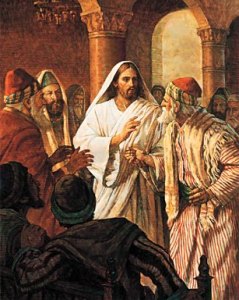 vs.1 The Pharisees and some of the scribes who had come from Jerusalem gathered round Jesus,
vs.1 The Pharisees and some of the scribes who had come from Jerusalem gathered round Jesus,
vs.2 and they noticed that some of the disciples were eating with unclean hands, that is without washing them.
vs.3 For the Pharisees, and the Jews in general, follow the tradition of the elders and never eat without washing their arms as far as the elbow;
vs.4 and on returning from the market place they never eat without first sprinkling themselves. There are also many other observances which have been handed down to them concerning the washing of cups and pots and bronze dishes.
vs.5 So these Pharisees and scribes asked him,
“Why do your disciples not respect the tradition of the elders but eat their food with unclean hands?”
vs.6 He answered,
“It was of you hypocrites that Isaiah so rightly prophesied in this passage of scripture:
‘The people honour me only with lip-service, while their hearts are far from me.
vs.7The worship they offer me is worthless, the doctrines they teach are only human regulations.’
vs.8 You put aside the commandment of God to cling to human traditions.”
vs.14He called the people to him again and said,
“Listen to me, all of you, and understand.
vs.15Nothing that goes into a man from outside can make him unclean; it is the things that come out of a man that make him unclean.
vs.21 For it is from within, from men’s hearts, that evil intentions emerge: fornication, theft, murder, adultery,
vs.22avarice, malice, deceit, indecency, envy, slander, pride, folly,
vs.23 All these evil things come from within and make a man unclean.”
*******************************************
We have four commentators available from whom you may wish to choose .
Michel DeVerteuil :Holy Ghost Priest, director of the Centre of Biblical renewal.Trinidad W.I.
Thomas O’Loughlin:Prof, of Historical Theology University of Nottingham NG7 2RD
Sean Goan:Studied scripture in Rome, Jerusalem and Chicago.
Donal Neary SJ:Editor of The Sacred Heart Messenger and National Director of The Apostlship of Prayer..
****************************************
Michel DeVerteuil
Lectio Divina with the Sunday Gospels
www.columba.ie
Textual Comments
Today’s passage contains several sayings of Jesus which are very well known; we must therefore make an effort to read the passage not as an abstract teaching but as a story, letting the message emerge from the interplay of characters.
There are three characters, all representing roles in a human community.
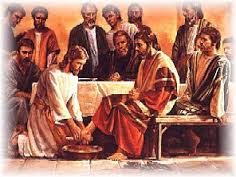 1. Jesus‘disciples are humble people. They are not “respectable” or “refined”. They do not conform to social norms (“the traditions of the elders”) in how they speak, dress or, in this case, “eat with unclean hands“. In the gospels they are classified as “sinners“, those who “break the law“. To judge from Jesus’ remarks in this passage, they are not malicious, their hearts are not unclean.
1. Jesus‘disciples are humble people. They are not “respectable” or “refined”. They do not conform to social norms (“the traditions of the elders”) in how they speak, dress or, in this case, “eat with unclean hands“. In the gospels they are classified as “sinners“, those who “break the law“. To judge from Jesus’ remarks in this passage, they are not malicious, their hearts are not unclean.
2. The “Pharisees and scribes“ are those who set the norms, in words and in practice. They observe and teach the rules of respectability, their etiquette is beyond reproach.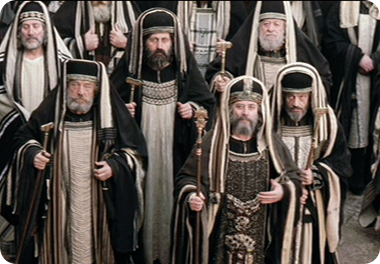
But they are judgemental of those who do not conform; they do not take time to understand them and in the process they are blind to the fact that they go against basic virtues such as humanity and compassion.
Very significantly, the text says that they have “come from Jerusalem“. The company of Jesus and his disciples is not their home territory; they are out of place among these local people.
3. Jesus as always is the protector of the poor. He sees the greatness and beauty that lie beneath their rough externals, defends them passionately against their oppressors. He is harsh with the scribes and Pharisees, but his harshness (as God’s harshness in the Bible) is because of his concern for the poor.
The movement of the story shows the process by which the Church, and every human community dedicated to noble ideals, gradually becomes set in its ways and ends up accepting the false values of the surrounding culture. The Bible always gives a simple criterion for recognizing when this happens – the poor and the marginalized in a country end up being poor and marginalized in the Christian community as well.
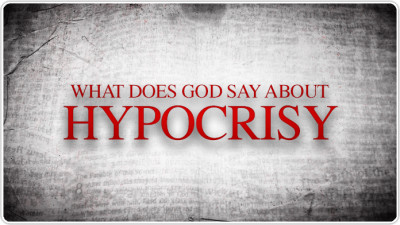
The root problem lies with laws which exist originally to protect the weak but end up on the side of the powerful. Someone like Jesus must come on the scene and expose the “hypocrisy“ of the community by standing up for the lowly. The community is then forced to revisit its laws in order to distinguish the true ideals of the community (“God’s commandment“) from the “human regulations” which maintain the status quo.
Every community and movement needs laws and customs, as Jesus always taught; but they must be constantly re-examined to see of they conform to God’s laws. This passage invites us to recognize God-in-Jesus at work in this way in our Church communities and in the world.
We will recognize him at work within our individual selves too. Often we allow ourselves to be oppressed by so-called “laws” that are not from God but are social taboos (gender or ethnic stereotypes, for example). Now they simply block our true selves (“our hearts“).
One day Jesus comes into our lives – through a friend, a spiritual guide or a moment of prayer – and rescues us from oppression. Being God’s instrument of liberation is often the principal role of the counsellor or spiritual guide. It is also the lofty vocation of the moral theologian in the Church.
Prayer Reflection
Lord, we remember times when we felt out of place,
*among people wealthier or better educated than ourselves;
* when we returned to church after staying away for many years;
* because we were not as successful as our brothers and sisters;
* in a strange country where no one understood what we said.
It was like when the Pharisees and some of the scribes who had come to Jerusalem gathered around Jesus and noticed that his disciples were eating without first washing their hands.
We too were made to feel that we were unclean
because we did not respect the traditions of the elders.
We thank you that you sent someone like Jesus who protected us
* one of our parents, an uncle, an aunt or a grandparent,
*a teacher or community leader,
* a friend who understood what we were going through,
*a book that touched us.
They taught us that what counts in life are the things that come from within,
these are the things that make us unclean.
We were able then to recognize what is merely custom
and in fact keeps people far from the truth of themselves.
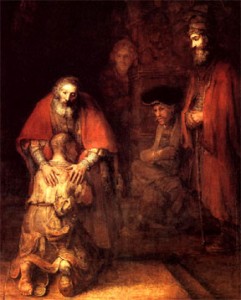 Lord, forgive us members of your Church that we focus on being loyal members of your Church and keeping its laws, while we put aside your first and only commandment of universal love and compassion, ignoring sexism, racism, elitism, cultural imperialism and religious intolerance, all these evil things which come from within the worst of the human heart and make humanity unclean.
Lord, forgive us members of your Church that we focus on being loyal members of your Church and keeping its laws, while we put aside your first and only commandment of universal love and compassion, ignoring sexism, racism, elitism, cultural imperialism and religious intolerance, all these evil things which come from within the worst of the human heart and make humanity unclean.
Lord, we thank you for sending us Bernard Haring and other great moral theologians.
Church discipline had become set in its ways and was reinforcing the false values of our culture
*laws on divorce and remarriage were weighted against deprived families;
* liturgical rules reinforced the superiority of Western culture;
* seminary studies did not reverence traditional religions of Africa and Asia;
* sexual morality favoured men;
* the laity were deprived of our teachings on mysticism.
Bernard Haring CSsR, Peter McVerry SJ, Br Kevin, O Cap (Ireland), Thomas Merton and other prophetic figures were the presence of Jesus among us, showing that judgements were being passed by an elite, isolated from the reality of people’s experiences
like the Pharisees and scribes coming down from Jerusalem.
What were called the customs of the elders were rules concerned with external cleanliness which the humble could not live up to.
Doctrines were put forward as if they came from you when in fact they were only human regulations;
your commandment of universal love was put aside so that traditions could be upheld.
We thank you that Jesus was in them, calling your Church to listen – all of us -and understand that nothing which comes to us from outside can make us unclean;
only the things that come from our hearts make us unclean.
Lord, we pray that in our parish liturgies
we will give every opportunity to the marginalized,
* allow those without much education to read
* arrange processions/ services in which disabled people can take part
* ensure that foreigners can understand the homily
( Image right>: Pope Francis unveils a new statue of a homeless person at the Vatican 2020)
* give special welcome to those who cannot receive communion.
In this way we will not honour you only with lip service
but our hearts will be close to you, our worship will be precious to you, and we will be following your teachings, not mere human regulations.
It belongs to the very substance of nonviolence never to destroy or damage another person’s feeling of self worth, even an opponent’s.
We all need, constantly, an advance of trust and affirmation. — Bernhard Haring
Lord, your will is that we should live with people very different from us
* those of other religions
* people with ancestral cultures of Africa, Asia, and Latin America,
* different ethnic groups
*the world of high technology
* the youth culture of today.
* Marginalised people
Help us not to become like Pharisees and scribes coming to Galilee from Jerusalem, noticing how others do things differently from us.
Help us to discern what in our culture is merely human regulations which do not make anyone clean or unclean,
so that we will repent of paying only lip service to the lofty principles we proclaim and recognise that so much of what we call holy is worthless and that many of what we call doctrines are merely human regulations.
Lo rd, we thank you that in our time the Bible has become once more the soul and source of your Church’s theology, enabling us to recognise that many of what we called biblical doctrines were no more than human regulations.
rd, we thank you that in our time the Bible has become once more the soul and source of your Church’s theology, enabling us to recognise that many of what we called biblical doctrines were no more than human regulations.
Lord, we thank you for moments of deep prayer
when you showed us clearly that the laws we were breaking did not make us unclean because they were only human regulations,
that we could go beyond them and find our purity of heart.
*************************************
Thomas O’Loughlin
Liturgical Resources for the Year of Matthew
www.columba.ie
Introduction to the Celebration
We gather here because Jesus has made us welcome. He has called us, he has chosen us, he desires that we love one another around his table. This is our great religious gathering: we affirm who we are, what we believe, we ask the Father for our needs, and we thank him for our lives and all our blessings.
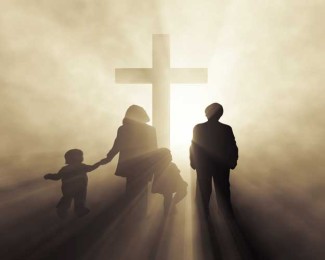 So what are the characteristic human qualities with which we should approach God? For many, it is some notion of being ‘clean‘, or having observed all the minute rules, having done and said all the correct things connected with religion. Today, Jesus lifts us completely out of that view. In order to be able to stand here in the presence of the Father, we must be people whose lives bring forth good for others, who do not injure others, and who seek to care for others.
So what are the characteristic human qualities with which we should approach God? For many, it is some notion of being ‘clean‘, or having observed all the minute rules, having done and said all the correct things connected with religion. Today, Jesus lifts us completely out of that view. In order to be able to stand here in the presence of the Father, we must be people whose lives bring forth good for others, who do not injure others, and who seek to care for others.
Homily Notes
1. This gospel’s message can seem trite to the point of irrelevance. Our society takes three things for granted — indeed, it makes them the basis for much of its thinking about religion in general and about Christian observance in particular.
Firstly, active morality is more important than religious ritual.
Secondly, intention is more important than following prescriptions about details: following conscience is the high road to moral integrity.
Thirdly, what’s really important in what religious leaders, such as Jesus, have taught is basic human morality: so avoiding murder, theft, and avarice are more important in living a good life than regular prayers or obeying rules on ‘observances‘. All that is ‘mere ritual‘ can be put to one side, so long as we behave morally towards others. There is much truth in all of this — so is today’s gospel simply Jesus’s affirmation of this position?
 2. If this is so, then this piece of gospel, good news, is not really good news at all! Moreover, in the early communities where this was preached they were careful about regular prayer, gathering for the Eucharist, and conveying a new style of living — so is this gospel really saying that all that activity was really irrelevant, and that so long as people conscientiously followed a way of respecting others, then the ‘religious bits’ were dispensable? That is how many would read or want to read this gospel:
2. If this is so, then this piece of gospel, good news, is not really good news at all! Moreover, in the early communities where this was preached they were careful about regular prayer, gathering for the Eucharist, and conveying a new style of living — so is this gospel really saying that all that activity was really irrelevant, and that so long as people conscientiously followed a way of respecting others, then the ‘religious bits’ were dispensable? That is how many would read or want to read this gospel:
care of others is fine,
care of the planet is fine,
some spirituality (as a private commodity) is fine.
But ‘religion‘ with its group observances, its gatherings, and its demands is just old hat!
And, according to the way that many people read this gospel, it seems that Jesus agrees.
3. Therefore, this is a very good day to point out just how easy it is to hear ancient scriptures, imagine that one understands them, and then go off with totally the wrong idea. The essence of all fundamentalism is to take ancient writings from another culture, another way of thinking and understanding, and to colonise them so that they mean what we think they mean in our culture.
Therefore, preaching today should have two objectives.
First, to show the gathering just how easy it is to read a text and take completely the wrong message from it — and, thereby, to show them the dangers of biblical fundamentalism.
The second objective is incidental: to show how this gospel still has a key message for us, and how we might get at it.
4. Showing the dangers of fundamentalism is something that has to be done in a number of steps.
Step 1: To show that a ‘simple‘, so-called ‘obvious” plain’ reading of the text, leads to a contradiction. Namely: if it is the case that the ‘religious bits’ can be just side-lined in favour of being kind to one’s neighbour, why did the early Christians who first heard this gospel — and were in a far better position to understand it that we are — pay such attention to those very religious bits?
Step 2: If the ‘plain, simple‘ reading leads to a contradiction (i.e. ‘it just does not add up’), then are we missing something in today’s gospel? We should note that the Pharisees do not accuse Jesus’s disciples of being bad people, nor do they accuse them of being unjust, or even of lacking in holiness. What they accuse them of being is ‘unclean.’
Step 3: We still use in everyday life the notions of being just/unjust (this is a quality of individuals); we also use the notions of being caring / uncaring (again, a quality of individuals); and we even, sometimes use the notion of being ‘holy’ — but we tend to think of it in terms of individuals so we say X or Y is a holy person, but we have difficulty nowadays in thinking of a collectivity as holy as in ‘the holy church of God.’
However, we do not use the notion of clean/ unclean as a category for people. So to understand today’s gospel, we must first discover what the notion of clean / unclean (alien concepts in our culture) meant in a culture that is very foreign to our own.
Step 4: Clean/unclean are not individual virtues, but social qualities: the real danger of someone doing something unclean is not what it does to the person as an individual, but what it does to the whole group to which the person belongs. This is a very different way of thinking to how we think: the whole group is affected by what we think of as purely private actions. The reason that the Pharisees are worried about what the disciples are doing is not because they are concerned for the souls of the disciples, but because they are concerned for themselves! The impure actions of the disciples is making everyone — who is gathered in the same place as the disciples — unclean!
We can barely understand this type of thinking. Perhaps the nearest we come to it is when there is a flu bug about and people are asked to stay at home, not because it will make them better, but because it will stop it spreading and make the larger group unwell. Uncleanness is like a contagion: the whole group suffers because of the carelessness and lack of group awareness and group care of individuals.
Step 5: Knowing that, how are we to understand this gospel? Jesus does not dismiss the notion of uncleanness, he changes the list of actions by which an individual can damage the whole group, and its ability to stand before God as a holy people. The actions of individuals that damage the whole group, its ability to be the people of God, its ability to stand before God and ask for its needs and the needs of humanity (as we will do in the Prayers of the Faithful) and its ability to reflect God’s love to the world is the list given at the end of the gospel.
Step 6: Each hearer of the gospel gathered today (especially clergy in the aftermath of child sex-abuse scandals within the church in recent years) have to ask how his/her individual actions have not only damaged them as individuals, but have had the effect of making the whole people unclean, unholy, unfit to stand before the world as the Body of Christ.
Step 7. Discovering how easy it is to slip into fundamentalism is something that takes most people by surprise: and it is a lesson we have to learn over and over again. Discovering the ‘deeper‘ meaning of the gospel — as opposed to a trite message that suits us — can also be a painful surprise: today is a case in point.
**********************************
Sean Goan
Let the reader understand
www.columba.ie
Gospel
As we return to Mark we find ourselves in yet another story of conflict between Jesus and his opponents. Here the Pharisees are reprimanding the followers of Jesus for not engaging in ritual washing before they eat. This is an example of a tradition handed down in Pharisee circles which had come to have the full force of the written Law. Jesus has little time for their legalism and quotes from Isaiah to make his point. This is only lip service to God who does not care about their external observances but who desires a true worship of the heart. A person cannot be made unclean by external factors, e.g. the failure to observe purely religious ritual; rather we are made unclean by that which comes from within, from our hearts, the source of our moral action.
This is an example of a tradition handed down in Pharisee circles which had come to have the full force of the written Law. Jesus has little time for their legalism and quotes from Isaiah to make his point. This is only lip service to God who does not care about their external observances but who desires a true worship of the heart. A person cannot be made unclean by external factors, e.g. the failure to observe purely religious ritual; rather we are made unclean by that which comes from within, from our hearts, the source of our moral action.
Reflection
If a survey were to be conducted among churchgoers in which they were asked for a definition of religion it is unlikely that many would come up with the simple answer provided by James. Coming to the help of orphans and widows would be for many a kind of agreeable by-product of religion whereas James places it right at the centre of who we are and what we do. This is surely a message for today when so many people go to such great lengths in their search for wisdom and the knowledge of God. A religion that can be observed at a purely external level has a certain appeal. It is easy to feel we are making progress and that we are better than those who do not measure up. We imagine that by our own efforts we can come close to God. However, Jesus wants no part in such a sham. He is concerned with the heart and a faith that does justice.
*******************************
With Lips or Heart?
With some vegetables you eat the leaves and the outside. With an artichoke we get to eat the heart. It’s the best bit. The best of religion is of the heart. Jesus today talks a lot about that –contrasting with lip service and hearts far from him.
The people who were wondering about sincerity. They kept the law but then were intolerant of weakness in others. They missed often on people’s goodness and so they talked of people who didn’t wash hands, cups and God knows what else.

We say that otherwise too –
Get to the heart of things –
a person has great heart –
put your heart into it –
their hearts are miles away.
The ‘heart‘ is the place of true religion.
The heart is a dangerous place. The head will try to be sensible –‘ let the third world look after itself, after all they are spending so much on war,’ but the heart will be broken by the hunger of the poorest.
The head will tell you that you need sleep but your heart will get up to care for a baby or an elderly parent. So the religion of some of Jesus’ time was safe –the rules were kept but was there love?
In prayer allow God touch your hopes to love well in life.
Teach me your truth O Lord, in the sincerity of my heart.
The heart of religion is found in the heart of God.
Kahlil Gibran writes in his book ‘The Prophet’:
‘When you love, do not say: God is in my heart
– say rather I am in the heart of God’.
************************